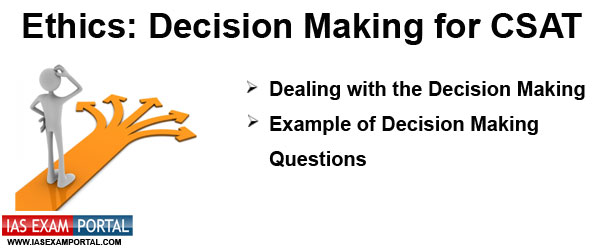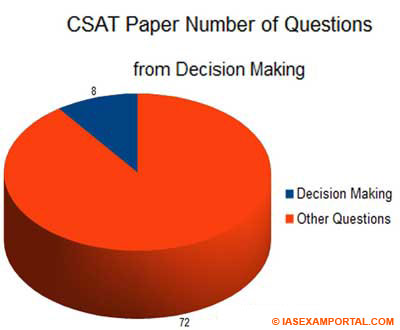NEW! The Gist (FREE) | E-BOOKS |
Article: Decision Making for CSAT

Article: Decision Making for CSAT
IASEXAMPORTAL presents a guideline to tackle with the Decision Making section for the CSAT exam.
The Decision making section could be a silver lightening, in the dark sky. Since there is no negative marking for not being able to choose the correct option, it gives you the opportunity to boost your marks, 'without risk'. However, dealing with the questions of decision making requires an ethical mindset, to understand the questions, and take decisions, while showing your presence of mind.
Ethics is an integral part of any decision making process. Our choices and preferences are guided by our moral predispositions and cultural background. Thus, we find different individuals having different opinions and likings for the same object.
It must be remembered that the ultimate goal of all ethics is the welfare/happiness of human beings. The only place where the ethics and morality differ is the means to achieve the noble ends of the human society.
However, under all the diversity and differences in the human societies, there is one common value that flows through the human civilization as a whole. This value is the respect for human life and dignity.
The CSAT paper of the IAS (Pre.) throws before the candidates around 7-10 questions from the decision making section. A peculiar characteristic about the questions of the decision making section is that- there is no negative marking for choosing the incorrect option. Since the nature of the questions of decision making is subjective, it is difficult to ascertain that which option is the most appropriate. Thus, UPSC does not penalize the candidates for choosing the options, other than the most appropriate one.
GS Foundation Course (PT+ MAINS) for IAS EXAM
सामान्य अध्ययन (GS) फ़ाउनडेशन कोर्स (Foundation Course) PT + Mains, HINDI Medium

As IAS aspirant, thus, should take every opportunity to secure the maximum marks in the decision making section.
Dealing with the Decision Making
Tackling with the questions of the decision making can be a tricky part, if you are acquainted with the various principles that govern the decision making process in the state machinery. Thus, it is necessary to develop a basic understanding of the principles that guide the decisions of the administrative machinery.
The questions in the decision making section, put before the candidate, situations that are full of moral-professional dilemma, and asks the candidate to take firm decisions.
Thus, you should keep in mind the following principles, that guide the decision making processes in the government structures:
-
Human Life and Dignity is the fundamental Value of any ethical system. Any decision of the administration or organization should respect the human life and dignity, as a moral being. Every human being is a free agent capable of making decisions for his own. Thus, no action of the administration/state should endanger or disrespect the dignity of the human being. While the life of the individual is a sacred right, which no one can infringe upon; the value of the life is derived only when it is endowed with dignity and self-respect.
Thus, an administrator should take no decision which is disrespectful to any individual. -
The purpose of any government/administration is the welfare of the masses. The state exists for the good of the individual. Thus, no decision of the administration should put the welfare of the masses at stake. If a decision or rule is contrary to the good of the society, it is worthless. The acts and decisions of the government servants should be aimed towards the welfare of the people.
Here, the consideration of the personal interests and other vested interests are antithetical to the purpose of the public organization. -
No decision shall be made hastily and without proper evaluation of facts. The working of the state structure is based on certain principles, which require the evaluation of all the aspects of the matter, before giving a verdict on it. Thus, an administrator shall not act 'in the flow of emotions'. The actions of public servants should be exemplary to others. Decisions of the public servants should be dictated by reason and values.
-
A Decision should be substantive. It should not be ambiguous and lopsided. Civil Servants are responsible for most of the decision making in the government structure. Thus, there decisions should not be ambiguous and vague. The whole administrative machinery is based on the decisions of the administrators. Thus, your decision should be substantive. It should either direct the course of action towards results, or further it towards its logical conclusion. A good public administrator is decisive.
-
Decision making should be in line with the principles and objectives of the organization. The public administrator has to work within the confines of his jurisdiction. Many-a-times, there might be situations where the administrator has to face moral dilemmas. Here, it is important to act in a just manner, while ensuring the adherence to the principles and objectives of the organization.
Example of Decision Making Questions
Question 1: A Public Information Officer (PIO) has received an application under RTI Act. Having gathered the information, the PIO discovers that the information pertains to some of the decisions taken by him, which were found to be not altogether right. There were other employees also who were party to these decisions. Disclosure of the information is likely to lead to disciplinary action with possibility of punishment against him as well as some of his colleagues. Non-disclosure or part disclosure or camouflaged disclosure of information will result into lesser punishment or no punishment.
The PIO is otherwise an honest and conscientious person but his particular decision, on which the RTI application has been filed, turned out to be wrong. He comes to you for advice.
The following are some suggested options. Please choose the option that you think is the most appropriate:
- The PIO could refer the matter to his superior officer and seek his advice and act strictly in accordance with the advice, even though he is not completely in agreement with the advice of the superior.
- PIO could ask his seniors to transfer the case to some other PIO, as there is a vested interest of the concerned PIO in the case.
- The PIO could weigh the consequences of disclosing the information truthfully including the effect on his career, and reply in a manner that would not place him or his career in jeopardy, but at the same time a little compromise can be made on the contents of the information.
- The PIO could consult his other colleagues who are party to the decision and take action as per their advice.
Answer: Here the most appropriate option would be (II) because by doing this, the PIO has expressed his involvement in the case, and admitted that it might affect the service delivery by the PIO. It is legitimate for a public official to declare beforehand, about his vested interest.
Other options might not be as appropriate because: Option (I) might be resorted to, but there is a possibility that the superior might advise some unethical path, which would be unethical on the part of the PIO. Thus, it would be inappropriate to follow the advice the superior by word. PIO might take his advice but should judge the value of the same and act by his wit.
Option (iii) would be unethical on the part of the PIO. As a public functionary, his duty is to communicate the facts objectively. By manipulating the facts, in order to save himself, the PIO would commit an unethical and unprofessional act.
Option (iv) is contentious, as the colleagues might advise him to take an unethical path. Since the PIO is an honest and conscientious person, he shall rely on his principles to take an appropriate action.
Question 2: You are the Executive Director of an upcoming Infotech Company which is making a name for itself in the market.
Mr. A, who is a star performer, is heading the marketing team. In a short period of one year, he has helped in doubling the revenues as well as creating a high brand equity for the company so much so that you are thinking of promoting him. However, you have been receiving information from many corners about his attitude towards the female colleagues; particularly his habit of making loose comments on women. In addition, he regularly sends indecent SMS' to all the team members including his female colleagues.
One day, late in the evening, Mrs. X, who is one of Mr. A's Team members, comes you visibly disturbed. She complains against the continued misconduct of Mr. A, who has been making undesirable advances towards her and has even tried to touch her inappropriately in his cabin.
She tenders her resignation and leaves your office.
Which of the following would be your first step?
A. Explain the female employee about the credentials of Mr. A and ask her to ignore the issue.
B. call an urgent meeting about the issue and take disciplinary action.
C. immediately expel Mr. A for such act.
D. First, talk to Mrs. X and calm her, as she is under a traumatic condition. And assure her that a strict disciplinary action would be taken at the earliest.
Answer: (D)
Option (A) might not be resorted as it would be highly unethical to expect Mrs. X to forget the issue. Issues of sexual harassment shall not be ignored.
Option (B) might be considered, as no decision can be taken arbitrarily, and proper channels have to be followed. However, given the exigency of the case, it is of an urgent need to take some immediate actions, while protecting the privacy of the lady employee.
Option (C) might appear just, but might not be the best course of action, because in an organization decisions are made through proper channels and procedures. Thus, while there is no doubt that Mr. A shall be given severe punishment for his offense, this shall be done through organizational procedure.
The Option (D) is the most apt course of action, as it addresses the immediate as well as long-term needs. Since Mrs. X has faced an assault, she is in a disturbed state. It is the foremost duty of the head, to calm her, and make her understand that justice would be done. She shall also be assured that her privacy would be protected. Further, the perpetrator should be dealt strictly, as there are multiple proved incidences of sexual advances from his side. Thus, as the final decision, Mr. A shall be expelled from service, with an appropriate legal action against him.
You should read the above given examples and try to deduce the principles, on the basis of which the decisions have to be taken. IASEXAMPORTAL will provide you with more articles on different subjects for the Civil Services.
Please feel free to contact us regarding your confusion and queries.
All the Best Candidates!!
Team IASEXAMPORTAL
